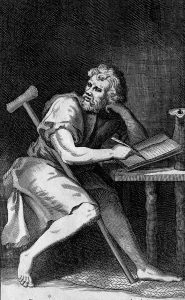PRESBYTERIAN STOIC
DO I HAVE RELIGIOUS BELIEFS?
This is a question I am asked now and again. I am generally reluctant to answer that question as my answer puzzles everyone.
I describe myself as being that of a ‘Presbyterian Stoic’ and on occasion, incorrectly as a stoic Presbyterian! Confused?

Well, so am I occasionally. The description comes from my upbringing. Initially a Presbyterian I became interested in philosophy, particularly the classical Greek philosophers and one in particular – Epictetus.Details of Epictetus’ are rather sparse. He was born about 55 A.D. probably at Hierapolis, Phrygia. His given name is unknown; the word epíktetos (ἐπίκτητος) is Greek for “gained” or “acquired” and Plato another Greek philosopher Plato in his “Laws”, uses the term as property e.g.: “added to one’s hereditary property”. He spent his youth as a slave in Rome to Epaphroditos, a wealthy freedman and secretary to Nero.
Apparently early in his life he acquired a keen interest in philosophy and with the support of his owner, he studied Stoic philosophy under Musonius Rufus allowing him to rise in respectability as he became better educated. Origen stated that his leg was deliberately broken by his master whereas Simplicius says that he had been lame from childhood. He is typically depicted with a crutch. Epictetus obtained his freedom which seems to have coincided with the end of his master’s service at the death of Nero in 68. A.D. Thereafter, as a freeman he began to teach philosophy in Rome but about 93 A.D. Emperor Domitian banished all philosophers from the city, and Epictetus was banished to Nicopolis in Epirus, Greece, where he founded a philosophical school.
His most famous pupil, Arrian, studied under him when a young man (c. 108 A.D.) and claimed to have written the famous Discourses from his lecture notes, which he argued should be considered comparable to the Socratic literature. Arrian describes Epictetus as being a powerful speaker who could “induce his listener to feel just what Epictetus wanted him to feel.” Many eminent figures sought conversations with him. Emperor Hadrian was friendly with him, and may have listened to him speak at his school in Nicopolis.
He lived a life of great simplicity, with few possessions. He lived alone for a long time, but in his old age he adopted a friend’s child who otherwise would have been left to die, and raised him with the aid of a woman. It is unclear if they were married. He died around 135 A.D. After his death, according to Lucian, his oil lamp was purchased by an admirer for 3,000 drachmae.
“When we are children our parents deliver us to a pedagogue to take care on all occasions that we suffer no harm.
But when we are become men, God delivers us to our innate conscience to take care of us.
This guardianship then we must in no way despise, for we shall both displease God and be enemies to our own conscience.”
Posted in Uncategorized